car engine oil seal
Understanding Car Engine Oil Seals Importance, Types, and Maintenance
Car engine oil seals, also known as oil seals or crankshaft seals, play a crucial role in the overall performance and longevity of vehicle engines. These seals are designed to prevent engine oil from leaking out and to keep dirt and contaminants from entering the engine. In this article, we will explore the importance of oil seals, the types available, and essential maintenance tips to ensure your vehicle runs smoothly.
The Importance of Oil Seals
Oil seals are essential components of an engine's lubrication system. They help maintain the necessary oil levels within the engine by preventing leaks. Without properly functioning oil seals, engine oil can escape, leading to low oil levels, which in turn can cause serious engine damage. Low oil levels can result in increased friction between engine parts, overheating, and eventual engine failure.
Moreover, oil seals help to keep contaminants out of the engine. Dirt, dust, and other harmful debris can cause significant wear and tear on engine components. Oil seals act as barriers, ensuring that only clean oil circulates within the engine. This protective function is vital for maintaining engine health and performance.
Types of Oil Seals
There are various types of oil seals designed for different applications and engine configurations. The most common types include
1. Crankshaft Seals Located at the front and rear of the crankshaft, these seals prevent oil from escaping the engine and keep dirt out.
2. Camshaft Seals These seals are found at the ends of the camshaft and work similarly to crankshaft seals, maintaining oil levels while keeping contaminants at bay.
3. Transmission Seals These seals are crucial for ensuring that transmission fluid does not leak out and that dirt does not enter the transmission.
4. Wheel Seals These seals are found in the wheel bearings and prevent grease from leaking out and contaminants from entering the bearings.
Each of these seals is designed to withstand specific conditions, such as high temperatures and pressures, and is made from materials that can endure the harsh environment of an engine.
Signs of Worn or Failed Oil Seals
Preventive maintenance is crucial for keeping your vehicle in optimal condition. Knowing the signs of worn or failed oil seals can save you from more extensive damage down the line. Common symptoms include
car engine oil seal

- Oil Leaks Puddles of oil under your car or oil spots on your driveway are clear indicators of a possible oil seal failure
.- Low Oil Levels Frequent check-ups that show consistently low oil levels can suggest that oil is leaking from damaged seals.
- Engine Noise Increased noise from the engine may indicate that oil is not properly lubricating moving parts due to leaks.
- Contaminated Oil If you notice that your oil appears dirty or gritty, it may be a sign that contaminants are entering the engine due to faulty seals.
Maintenance Tips
Maintaining oil seals is essential for the performance and longevity of your vehicle's engine. Here are some tips to keep in mind
1. Regular Oil Changes Adhering to a regular oil change schedule can help prevent the breakdown of oil seals due to extended exposure to old, degraded oil.
2. Inspect for Leaks Regularly check for oil leaks, especially after long drives. Remember to look under the vehicle and around engine components.
3. Use Quality Oil Always use high-quality oil that is recommended for your vehicle. Premium oils can sometimes provide better lubrication and protection for oil seals.
4. Pay Attention to Engine Performance If you notice changes in engine performance or unusual noises, it’s wise to have your vehicle inspected to rule out any issues with oil seals or other components.
5. Consult a Professional If you suspect that your oil seals are failing, it’s essential to consult a professional mechanic. They can diagnose the issue accurately and recommend the necessary repairs or replacements.
Conclusion
Car engine oil seals are vital components that help maintain the integrity of the engine by preventing leaks and keeping contaminants out. Understanding their importance, types, and signs of failure can help you take proactive steps in maintaining your vehicle. Regular inspections and maintenance will not only extend the life of your oil seals but also enhance the overall performance of your vehicle, ensuring you get the most out of your investment.
-
oil-drain-plug-washer-reusable-types
News Aug.22,2025
-
oil-drain-plug-replacement-guide
News Aug.22,2025
-
heavy-duty-seal-waterproof-features
News Aug.22,2025
-
engine-oil-seals-installation-guide
News Aug.22,2025
-
seal-oil-for-sale-high-temperature-grade
News Aug.22,2025
-
cassette-seal-compact-design
News Aug.22,2025
-
Simplifying Oil Changes: A Comprehensive Guide to Oil Drain Plugs and Their Variants
News Aug.04,2025
Products categories















